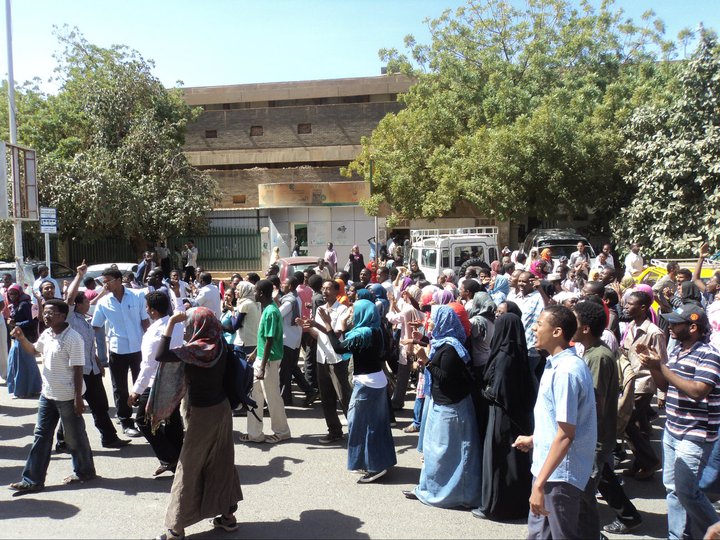spotlight on sudan: women leading a revolution
 A revolution has been brewing in Sudan for months now, but you wouldn’t know it by the shockingly quiet media coverage. The student-led revolt is trying to overthrow the regime of President Omar al-Bashir after a proposed austerity measure last month. With the demonstrations growing in size and intensity, this summer may be the boiling point of a year of tension between the people and the governments of the Sudans.
A revolution has been brewing in Sudan for months now, but you wouldn’t know it by the shockingly quiet media coverage. The student-led revolt is trying to overthrow the regime of President Omar al-Bashir after a proposed austerity measure last month. With the demonstrations growing in size and intensity, this summer may be the boiling point of a year of tension between the people and the governments of the Sudans.
But what does this revolution mean for the women there?
Last summer, after decades of civil war, the Republic of South Sudan became the newest independent state on the planet. When the borders were drawn, the new country with it the oil reserves in the region. A major source of revenue lost, al-Bashir announced, in June, a measure to deal with Sudan’s $2.4 billion debt and fledgling currency.
The implications for the Sudanese people include a significant hike in taxes on luxury goods, 35 per cent rise in transit fares in the city’s capital of Khartoum, and a reduction in fuel subsidies. Inflation in that country had already reached 30%.
The reaction was immediate. Students at Sudan University in Khartoum protested outside the university’s gates on 17 June, leading to a sweep at Alia University, also in the capital. According to reports from a CBC source in the city (the media outlet is one of the few covering the uprising), police responded with clubs, batons, rubber bullets and tear gas.
Within days, the demonstrations began to encompass more than just students and broaden past the issue of rising food and fuel costs. The Sudanese people are now hoping to take down a regime that has lasted over 20 years.
Many of those arrested have been women, who have led the revolt. A day after al-Bashir’s announcement, at least 200 female students walked out of class, in protest. Days later, women and girls staged a sit-in on the main street of the suburb, Bahri. They were sprayed with tear gas when they refused to move.
They marched on 13 July under the name Kandaka Friday (Kandake is a Kushite word for queen), calling for the release of those detained. The police arrested them instead. At least 40 women were sent to detention centres in Khartoum.
In all of this, the Sudanese government has insisted that the demonstrations are not serious, downplaying the incidents. Sudan has managed to stay out of the pro-democracy uprisings this year in neighbouring countries, Libya and Egypt. But the new austerity plan, coupled with the oft-forgotten (or ignored?) conflict in Darfur and the sudden split of a nation, the students of the Arab-African country have had enough.
The demonstrations have been relatively small compared to those of the Arab Spring, but any mobilization against governments in that region is cause for worry. Sudan especially. Since it’s independence in 1956, two regimes have been toppled there: once, during the October Revolution in 1964 and again, the beginning of civil war, in 1985.
For women in Sudan, protesting carries an enormous risk. Already, there have been reports of rape. One student from Elfashir University detailed her encounter with police on 10 July in a video originally posted on a Sudanese forum.
The Nobel Women’s Initiative issued a plea to the Sudanese government to release the women being held at Sudan’s National Security Services (NSS). The centres have a horrible track record of human rights violations, including sexual violence. Female activists last year were reportedly subjected to harassment and assault. Last February, art student Safia Ishaq recounted her rape by officers from the Security Forces. She was abducted as she walked through the university, thrown into a car and taken to their offices. Ishaq was questioned about her political affiliation, beaten and raped by three men before she was released.
Sexual assault and rape is has been used as a weapon in times of protest and war in sub-Saharan Africa for decades. Because virginity is so closely tied to honour in religious countries like Sudan and the Democratic Republic of Congo, the sexual violation of women is, sadly, routine. According to Women Under Siege, sexualized violence is used to destroy families, as a form of ethnic cleansing, and of course, to terrorize women.
In 2010, UN peacekeepers were accused of underreporting incidents of rape against Congolese women. They found more than 500 women and children had been sexually assaulted – double what was reported. Victims there are finally getting something that resembles justice as their abusers face trial.
But it is continuing in Darfur and across Sudan in the midst of anti-austerity demonstrations. It is an attempt to silence the discontent and opposition, especially of women who are most affected, worldwide, by poverty.
It’s a shame that in a year of intense media coverage celebrating the political engagement and revolutions of students around the world that the work and suffering of women in Sudan should go unnoticed.

